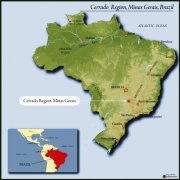Brazilian Coffee introduces the main coffee producing areas and taste graded coffee producing areas in Brazil.

The Republic of Brazil was born in 1890. In the early stage, it was similar to a military dictatorship. Nevertheless, the government recognizes the importance of coffee as a source of profit, especially due to the decline in the value of sugar and gold in the international market. The current policy allows coffee to be overproduced in the hope of replacing competitors; this is a promising strategy.
Brazil is the world's largest coffee producer, with the first total output in the world, accounting for about 1% of the world's total output. Brazil is mainly produced in the central and southern provinces. Brazil is suitable for growing coffee, the terrain is relatively flat, most coffee gardens are less than 1200 meters above sea level, and there is no shade from big trees, because it is not fine coffee because it is harvested with ripe berries at the same time. The quality of Brazilian coffee is average but less excellent, its bean quality is soft, and it is obviously not resistant to heat in the roasting process. Among the varieties, Santos is more famous, which is named after its export port Santos. Brazilian coffee beans are neutral and can be tasted individually (though a bit monotonous), or mixed with other kinds of coffee beans to form a comprehensive coffee, which is generally considered to be indispensable in blending.
Major coffee producing areas
Minas Gerais Minas Gerais, S ã o Paulo Sao Paulo, Bahia Bahia and Esp í rito Santo Espirito Santo account for 90 per cent of the country's exports.
Brazilian coffee flavor
Brazilian coffee has a grassy taste, smooth in the mouth, low acidity, nutty, sweet chocolate, well-balanced sour and bitter, mellow, usually with some woody and earthy flavor, which is quite different from the obvious floral and orange aromas of African beans.
Graded coffee producing areas in Brazil
Extremely meek (Strictly Soft): South Minas, Hirado, Mojiana, Bashiya turquoise plateau.
Supple (Soft): Bashiya, Minas southeast mountain forest, Parana, west-central S ã o Paulo, the hills of Espiritusando.
Slightly meek (Softtish): East and northeast of Minas.
Not easy (Hardish): Parana low Haida, Espiri Tusando.
Iodine choking (Rioy): Espiritusando flat, lower southeast of Minas.
Important Notice :
前街咖啡 FrontStreet Coffee has moved to new addredd:
FrontStreet Coffee Address: 315,Donghua East Road,GuangZhou
Tel:020 38364473
- Prev

Introduction to Puebla Coffee Region, Mexico Characteristics of Veracruz Coffee Region, Mexico
Pueblo is the capital of the Mexican state of Puebla, located east of Mexico City, between the Sierra Nevada and Sierra Madre in the east. Coffee beans from this area are always grown under macadamia nuts and pine trees, contributing to Puebla's coffee beans being filled with incredible aromas. BaJa coffee is P7cafe
- Next

Characteristics of coffee producing areas in Minas Gerais, Brazil. Introduction to the flavor of Brazilian Hirado coffee.
The state of Minas Gerais (Minas Gerais) is a state in southeastern Brazil. Minas Gerais has some of the highest mountains in the country, providing the elevation needed to grow coffee. Coffee produced on behalf of the state of Minas Gerais often holds 70 per cent of the medals in the annual COE Cup in Brazil. Cerrado with no bitterness,
Related
- Beginners will see the "Coffee pull flower" guide!
- What is the difference between ice blog purified milk and ordinary milk coffee?
- Why is the Philippines the largest producer of crops in Liberia?
- For coffee extraction, should the fine powder be retained?
- How does extracted espresso fill pressed powder? How much strength does it take to press the powder?
- How to make jasmine cold extract coffee? Is the jasmine + latte good?
- Will this little toy really make the coffee taste better? How does Lily Drip affect coffee extraction?
- Will the action of slapping the filter cup also affect coffee extraction?
- What's the difference between powder-to-water ratio and powder-to-liquid ratio?
- What is the Ethiopian local species? What does it have to do with Heirloom native species?

